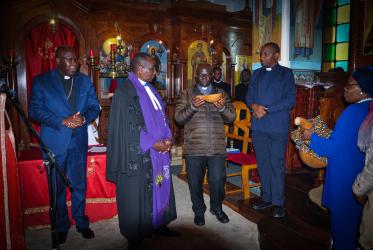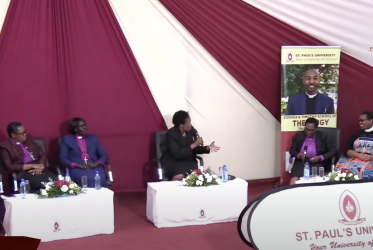The following text is part of a series exploring the topic of digital justice. The full series is being published in the days leading up to the International Symposium for Communication for Social Justice in the Digital Age which will be held 13-15 September. These interviews are intended to offer intergenerational—and honest—views of how we are living in a digital world, if churches are helping us, and how we can work together to define and pursue digital justice.
Moreover, a similar set of principles applies to the relationship between the digital world and the church, says Nairobi-based Waweru, who works for the WCC's Ecumenical Disability Advocates Network (EDAN).
"It's true that we are used to the conventional means of accessing churches and going to pray in our various denominations. Furthermore, this is how we have been accessing both in terms of spirituality through physically going to church.
"So, I think the relationship between the digital world and churches is evolving to such an extent that we are becoming a village. In many ways, and it is now possible to go to church, digitally, through online platforms, and where people from all backgrounds can connect with God."
Waweru believes this is making religion and the church more dynamic and more appealing.
'Understand how God works'
"It helps us understand how God works through inculcating creativity and innovation into humanity so that we can then experience the transformation of how we encounter Him," he says, speaking from the viewpoint of a person with a visual disability.
"The digital world is not always friendly to persons with disabilities. This is because accessing platforms present a challenge to us compared to our non-disabled counterparts," he says.
"This is because if you and I both have laptops, I will not access the digital content or the digital platforms unless I install special software called job access with speech use to read the screen out loud for me, which I have to buy for an extra $1,000," explains Waweru.
That means it is much more difficult for Waweru to cope with the digital platform due to his disability, presenting a difficult challenge.
The creators of the digital world create good innovation without bearing in mind every person’s needs with what is known as "universal design".
Elaborating, Waweru cites the example of in a building design, staircases are often designed without foreseeing there may be persons in wheelchairs who will need access.
"So, websites should be made accessible to allow every person access," he explains. "For example, for people who use sign language, you can use captioning, so they can learn whatever is on the video through the captions," says the EDAN representative. "These are important human rights affected by digital justice."
Accessible systems
Therefore, he asserts it is essential to create accessible and understandable systems open to every human able to accommodate all kinds of personalities.
In raising awareness, the church has a significant role in encouraging and managing the appreciation of God's creation, especially relating to those with disabilities.
"The digital phenomena presents a great opportunity for the church to be outspoken, to produce material that will enhance the visibility of different people, even those with disabilities, to enhance that uptake of information," says Waweru.
He is aware that the churches produce magazines, hold conferences and workshops online. The creation of awareness on the need to accommodate everyone is critical and to create inclusiveness of people with various disabilities to feel included and appreciated.
"And with that, God's love is reflected upon every human being without necessarily prejudicing those who have disabilities. So, we really need to think when it comes to different ways of accessing information, especially for the deaf," according to Waweru.
"It is easy to make captions so that someone who is blind can all access at the same time without having to overthink how one segment of the population will be accommodated.
He notes that various dynamics come into play, "and the church can equalize and enhance reasonable accommodation, through accessibility for all persons, for all of humanity."






